|

A natural collage in a rock garden.
(*photo credit)
March 1, 2011 Interior Ecology: A Personal
Frontier
The word "ecology" does not appear in a
single one of the former 1885 daily reflection titles, whereas "environment" in
its various forms appears thirty-three times. Why the difference, when good
environmental practice demands a balanced ecology? Perhaps the difference is
that ecology is academic study, and the reflections refer more often to
practical applications. However, we ought not to omit the world of ecology, and
so are looking at this more closely during this March month of housecleaning.
We look inwardly into the frontier of our own emotional life. Thus we discover
that Jesus is a good model of balanced interior ecology.
Jesus shows the balance of deep emotions
that sometimes seem counter to each other. First there is his mercy and
compassion for overlooked people -- and when he wept over Jerusalem. At the
same time, Jesus manifests a public and holy anger that underlies a prophetic
stance (when denouncing the Pharisees or driving the moneychangers from the
Temple). Jesus has the rare ability to balance seemingly conflicting emotions
and is able to express each in its proper turn. He is thus the perfect model of
ecology and ecological balance -- even more so than St. Francis whose compassion
for animals and other aspects of creation is legendary.
How do we handle our emotions, especially if
we are quite emotional people?
Differences in human practice must be considered in greater detail in our
personal prayer. We may be moved deeply by the actual damage around us or by
the ongoing actions of polluters. The challenge is always before us as we
tinker with our emotions and the need for some environmental advocacy. We are
tempted to strike out and strive to do something meaningful. The act may be
like punching holes in the wallboard, which relieves our pent-up anger, but
demands that we patch up the holes. We are not doing good by exposing ourselves
to recrimination for excesses taken, and so we learn to control but not lose our
righteous anger -- for how else can the world be a better place?
How can we be merciful and at the same time
directly confront the wrongdoing against ourselves?
Historically, many heroic people from prisoners of conscience to people
living ordinary lives have been successful. However, the merciful person is
challenged to retain a sustained anger against wrongdoing to others. This is
difficult and yet Christlike. It is not that one who gives up righteous anger
and retreats to silence and accepting the status quo. An advocate for justice
is required to be public, and this means a commitment to a position that is
often unpopular and even risky. At this point the advocate realizes the price
that must be paid and this elicits still more emotions, all of which have to be
controlled and utilized as necessary. It is hard to be merciful in the
long-term; it is doubly hard to sustain righteous anger and mercy in
equilibrium over that long period.
Prayer:
Lord help us to balance our righteous anger and godly
mercy and to use them both at proper times and places.

Discovering the joys of chewing an old stick.
(*photo credit)
March 2, 2011 Components of an Interior Ecology
We need to balance our anger and mercy, our
confrontation and compassion -- and more. We have to develop a broad-based
approach so that we give everything its due attention. The trouble is that our
duties seem never to end, for the more we do, the more people expect us to do.
In order to avoid burnout and thus withdrawal from all activism, we must pace
ourselves and look at all aspects of our interior ecological practice, knowing
what they are in order to avoid pitfalls and discover ways of improvement:
* Unrealized goals: Not everything we
seek now is attainable even in our lifetime. We must balance long-term goals (a
New Heaven and a New Earth), which are beyond our mortal life span and stretch
into eternal life, with short-term goals. The latter are hopefully reached in
our life's ever-shortening time span.
* Physical balance: We need to eat
well, refrain from tobacco, alcohol and drugs, and continue our physical
exercises on a regular basis; without good physical health we cannot be a
balanced person. Quite often we could sink into a condition where we deny what
is really happening. Advice from a friend may be what it takes to awaken us to
the needs we have -- including sufficient rest and removal of stressful
conditions.
* Energy balance: As we age, our
energy levels decline. We begin to experience the flagging of our physical
resources. This may demand more rest time in between activities. It also means
we will say "no" to additional activities (not doing some travel today) and yet
not regret that we are human -- and not the Almighty.
* Mental balance: We start to settle
for better access to existing but not retained facts (maps, catalogs, etc.),
rather than to attempt to remember things that we recalled a few years ago. Two
sets of keys and other sets of items strategically placed help reduce the stress
resulting from misplacement and loss. Exercises to retain a good and healthy
memory are available and encouraged.
* Economic balance: Living within our means once
we have a steady means of living is worth practicing. All too often people fail
to see bad economics as an imbalance.
* Political balance: In some ways this is the most challenging balancing act,
for we may regard compromise as wimpy; however, to hold on too tightly may prove
uncompromising.
* Social balance and tolerance: When
we act in public, we run the risk of people stepping on our toes. We must
always engage in civility even when it hurts, and this requires a "tough skin"
approach to reality. As we mature, we can look at these unexpected unpleasant
events with equanimity, and even laugh at ourselves in the process.
* Spiritual balance: A person who is caught in material allurements is hardly
able to maintain an interior ecology. Prayer life gives us a spiritual balance
(look ahead to March 4th where we see our weaknesses and our need for God).
Prayer:
Lord, it is good that we have an interior ecology so that we can be better
suited to help heal our wounded Earth.

Jefferson salamander, Ambystoma jeffersonianum,
which can live to an age of 30 years.
(*photo credit)
March 3, 2011 Enrichment of our Interior Ecology
We walk on a tightrope of life, and it takes
extra expertise not to slip and fall. Learning the balancing act often involves
our loss and regaining of balance through introspective considerations as well
as by receiving spiritual direction from others. In fact, a balancing act is
rarely done alone for we are social beings and grow through social giving and
receiving.
Reflect on goals -- We need the spiritual assurance that our lofty goals are more than
we can attain alone; we are but sowers while others may reap the harvest. Our
work is never the last word, and that is both satisfying and sometimes humbling.
Gauge in energy conservation -- Maturation allows us to come to our senses and
know our waxing and waning and see all, even our awareness of limitations, as
gifts from our generous Creator. A spirit of thankfulness is cultivated through
daily prayer.
Maintain physical health
-- This focal point has been treated in everything from
regular exercise to eating good and wholesome foods. Nothing new need be said
except to remain faithful to adequate and satisfying exercises.
Exercise the mind -- Even if facts are
retained, some effort could be made to read widely, discuss pertinent issues,
and do more than merely listen and observe. Rather engage in mental exercises
in an ongoing manner and hold serious conversations with others.
Be practical in economics -- Live simply
even if this demands downsizing; stay out of debt if possible; use credit cards
sparingly if at all, and live within a modest means.
Engage in politics -- Those who advise against talking politics in polite
society fail to realize that, when civility is practiced, political discussion
is exercising our citizenship.
Live a socially active life -- The Good Book
tells us how to live, and to do so with the deepest respect for all our
neighbors near and far. Regard interactions as acts of mercy and charity.
Do kind deeds each day -- Make every day a mark of gratitude for our God-given
gifts by sharing good things with those in need whether near or far away.
Exercise spiritually -- This involves daily prayer and meditation as well as a brief
reflection at the end of the day as to how things went in our lives -- and
thanksgiving to God for allowing us to live another day. Many fortify spiritual
growth through the call to the sacramental life.
Prayer:
Lord we know that re-establishing a global ecological balance depends on the
balanced interior ecologies of earth healers. Help us to spread this Good News
through being and doing.

Coming soon! March presents the spring beauty, Claytonia virginica.
(*photo credit)
March 4, 2011 Prayerfulness: Every Day is a Day of
Prayer
Today is regarded as the World Day of Prayer.
As any reader might know, I am in general agreement with most of the annual
designated days and have observed this one in the past. However, with time, I
have come to dislike this designation more and more, because the inference is
that other days are NOT days of prayers. Rather, we are told to pray always.
We do not have days called "Day of Eating" or "Day of Drinking;" maybe they are
out there. Eating and drinking are essentials for life -- and so is praying.
We are not to turn on and turn off periods of life when it comes to praying --
even when we are convinced that some folks are better at this sacred
communication than others of us. We honor them by requesting their prayers and
by asking them to help us pray.
Why instant moments of silence? I always
have difficulty when people gather and prepare for their meeting with a time of
silence in order to enter into a relationship with God. Perhaps this is a
salutary and worthwhile practice, but I always find it disconcerting, for I find
God present to us at all times whether these be silent or full of activity. God
is in our midst so why turn as though in search of someone out there in the
shadows? Is this a recognition that we are somehow out of communication and
must tune in to God?
What lies behind a day of prayer? I suspect that those who promote this day of prayer
have good reasons in mind since so many are forgetful and negligent in their own
prayer lives. However, we have to be careful in the way this is presented for
it has a streak of self-rightness about it -- and we can fall into this so
easily. So others do not pray and ought to. But how do we get them to? Is
there a way of life that we are called to follow, which makes others see us and
reflect upon their lives. The exterior acknowledgement involves our respecting
the prayer life of others and recognizing their efforts as praiseworthy.
What is the benefit of such a day? Maybe
this day has value in the privacy of our introspection more so than in the
public domain to which it is intended to apply. This is not a time to convert
others to our way of praying but to become confident of our own way and that
this will reflect itself out to others over time. I once had to participate in
a National Day of Prayer at the Frankfort state capital and recall that
my prayers were not well received because the words lacked the more patriotic
language that others had in a more patriotic sense. So the prayer day could be
captured by those with an agenda when, in fact, prayers have that individual
flavor of the one praying.
Prayer:
Lord, help us to pray always, and not just on special days of the year. Lead us
to a balance in our prayer life so that we spend some time in begging for
forgiveness and special favors and other periods in prayers of praise and
thanksgiving. We have needs and we see them fulfilled, and thus see life as a
continuous give and take, of ebb and flow, of rough detours and smooth riding.

A kind neighbor pays a visit.
(*photo credit)
March 5, 2011 Hidden Freedoms of the Elderly
How pleasant is the day when we give up striving to
be young and slender.
William James
Old age creeps up upon those pretending to
stay young and with it comes a lessening of energy levels, a growing group of
aches, and decreased mobility. It seems so troubling, especially with
tightening economics and budget restrictions. One can expect elders will be
seeing a decline in certain health or other benefits -- and thus loss of
freedoms because of eroding independence. However, all is not darkness. Given
the availability of basics of life, we can find hidden freedoms with aging.
Yes, this is a challenging exercise, especially for those of us who are
restricted in driving or forced by impaired mobility to resorting to wheelchair
or walker. We still have freedoms that even grow.
What about freedom from damaging one's life
span? Recall how
many times we read or hear of practices (smoking, drinking, eating fatty foods,
etc.) that cut one's life span. This becomes a nagging feeling each time we
tinker with what others regard as health dangers. When one exceeds normal age
(now 77.8 years for Americans), he or she can only expand life spans by living
another day. Each year beyond the average 77 years, I contribute one-fifth of a
second to the average life span of the American male. Younger folks can shorten
life spans, but I can only add to that average span after a certain age. Note:
this does not mean we are free to take up bad habits, though I have heard of
people beginning to smoke in their eighties because fellow senior citizens do.
What about freedom to focus on what is
important?
Elders with
faith have one major undertaking still before them -- eternal life. Amazingly,
many younger people, even after youthful ambitions fade in middle age, find
little to await them if their faith is not strong. Often, these non-seniors are
not nearly as realistic, and so try to fill the void of goals with inane
practices or mere entertainments that do not enhance their eternal future.
Elders have a deeper sense of what lies ahead, and this focuses reality more
quickly even when their minds slip and their memory declines.
How about freedom to speak without
jeopardizing one's status?
All too often those with a certain office or job will not want to be considered
out of harmony with a boss or the peer group; so they find it preferable to
remain silent even when the Spirit prompts them to speak. However, elders do
not feel obliged to ensure a rank or position of honor if speaking in a
prophetic manner. What is wrong with saying the truth or confronting a
dangerous situation? "I am too old to remain silent."
How about freedom to pray and reflect? Many excuse themselves as too busy, but elders can
overcome this excuse, and relax in the presence of Divine Grace. Continue
reflecting and praying to find further degrees of freedom with each passing
year.
Prayer:
Lord, help us to see the blessings of every age.

Greening of the land in early March.
(*photo credit)
March 6, 2011 Face Hypocrisy in All Its Forms
All who hear my words and put them into
practice are like the wise who build their houses on rock. (Matthew 7:21-27)
One earlier essay (November 13, 2008)
mentioned forms of "eco-hypocrisy" by those professing to be "green" but really
not looking deeply into their practices (e.g., burning up fuel in an expensive
vehicle to deliver recyclables to a distant center). Other examples were
traders being enriched in "cap and trade" schemes, bumper sticker holders who
waste fuel, some conference-going air travelers, homesteaders or tourists who
damage pristine areas, food faddists, and dwellers in spacious housing. For the
most part many of us have excuses and feel immune from each of the categories.
Do imperfect performances scare us? In order to be true healers we must examine our own
practices and reexamine them over and over. The sphere of hypocrisy in daily
matters such as resource use touches us all either individually or in community
-- and so settling on the examples mentioned above may give each of us a reason
for distancing ourselves from hypocrisy. One problem is that others will see
our practices and give them a good interpretation, when underneath we know we
have much additional correcting to do. The marvelous works (even miracles) that
we do are not ours but God's work, and so we are simply doing our duty. The
success is not ours but God's; however, we can be fooled by well-wishers to
think we are the ones effecting change.
Do we think of ourselves as reapers? Love of neighbor through service is the best remedy for
any temptation to hypocrisy. Here deeds that we dream of doing take on the
earthly "gray" of not being perfectly performed or being harmed through misuse.
Part success is what we face in building, maintaining, cooking, cleaning and so
forth. Earthhealing can even have its brand of hypocrisy. We can limit
ourselves to lesser activities and even elevate their importance. We can be
weighed down by reality -- lack of resources, cooperation, sickness, or a
multitude of excuses. Here in the midst of limitations we lack the honesty to
admit that our works are imperfect.
Are we willing to be sowers and not reapers? In order to establish rights, we must be the foundation
builders, not the ones who see the total edifice to completion. We declare that
rights are needed by ALL people not just a few. In saying so in areas of work,
health and education we are talking about immense outlay of global resources not
now available. But they ought to be the foundation on which a just and fair
economy can be built. It is enough that we show the goals, and then convince
people that they are not merely idealistic but quite possible to attain in time.
Prayer:
Lord, preserve us from any form of hypocrisy by allowing us to see honestly that
we are merely sowers and not reapers of your hidden but growing harvest. Help
us be faithful; that is sufficient for us -- and leave success to others.

Kentucky cabin, near Harrodsburg, the state's first city, founded 1774.
(*photo credit)
March 7, 2011 Question Issues Arising over
Rights
Well, now is the
favorable time; this is the day of salvation.
(II Cor. 6:2)
Why speak of vague
"rights" when we have enough on our plate? Rights issues pertain to our
sense of respect for self and others. In a world in which the commons must be
reclaimed, we always start by finding what are inalienable rights that cannot be
taken from the individual. In the twentieth century those wanting to share
resources in a commons often overlooked the rights of individuals to certain
aspects of life that the "state" could not abrogate. Thus a basic conflict
ensued, and when the state was almighty it had the power to trample (at least
for a time) on those individual rights to express oneself or to worship together
in community.
Where do rights fit into
a discussion of the Commons? Part of our "commons" discussion that is the
subject of monthly 2010 reflections (see Table of Contents) is based on our
right to share resources for the wellbeing of our people. If in theory these
have numerous rights and yet do not have proper food, air, water, energy,
lodging, etc. in which to live a higher quality of life, what does "rights"
really mean? Thus we do not so much probe the rights themselves that we all
know from within our moral compass, but rather consider issues that arise that
can infringe on rights. The task ahead seems daunting and we are tempted to
turn away.
Do we help establish
justice as citizens concerned about our own rights and those of others? It
becomes a basic duty to protect others whose rights are infringed upon. If a
country does not permit its citizens to exercise their free worship of religion,
this is not just an issue of co-religionists but of all people, for this
suppression is human injustice. Our silence is an assent when it comes to
injustices to our neighbor. All of us suffer when some are unjustly treated for
the social network is frayed by such actions. Furthermore, our neighborhood is
an entire world, and so the catholic approach to issues must always include
neighborliness.
Do rights emerge over
time? Certainly rights are inalienable but do we surface them with time and
circumstances, publicize them and defend them? As part of a world community,
efforts we make as individuals contribute to a cumulative effect. Just as our
misdeeds damage the entire human neighborhood or social structure, so do our
good deeds build up social structural relationships. In theory, we must
constantly struggle to improve our defense of rights exercised near and far.
Denial of known rights becomes a barrier to healing our Earth. Our rights are
part of our collective commons, even when they are individually exercised by
each person. Our freedom is at stake, a freedom that is not so absolute that it
becomes a license to infringe on another's rights. Now is the favorable time;
we see it is a duty to know rights and to defend those of ALL people, even when
they cannot articulate them.
Prayer: Lord, help
us to champion the rights of all.
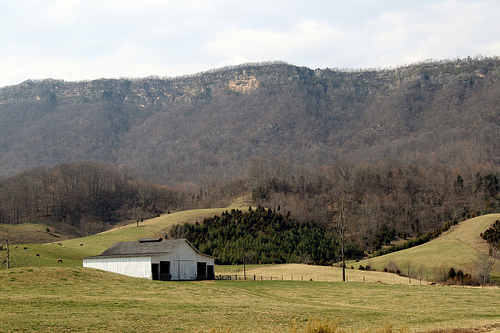
Barn in Lee County, VA.
(*photo credit)
March 8, 2011
Right to Privacy and Silent Space
We all need time and space
to be ourselves, to relax, and to find rest. Defending the private world of
individuals who have rights is often difficult because rights being exercised
by one can infringe on the rights of others. Complex questions arise.
Is privacy so sacred
that others are forbidden to interfere? "Mom, Jimmy is making a bomb in the
basement." Jimmy is acting privately, but the result of his actions may be
quite public and involve others in the building and beyond -- and the building
itself. Yes, privacy has its own limits. So much of what we do in private has
implications for the entire social network in which we live and move. We need
our privacy; we need to share the commons together; and we need to balance
both. A complementarity exists and a sound interior ecology must define the
boundaries of rights.
In this age of Facebook
and Twitter we ask where the private world ends and the public begins? "I
hear that Jimmy is on drugs," says friend to friend on the Internet or in the
privacy of person-to-person communication. Again, is this mere gossip or is
this valuable information for someone to help take corrective action? What if
poor Jimmy tries to go clean and Facebook and Twitter are unrelenting. Here the
privacy of past life gives way to a publicly exposed individual in need of the
space to start life over -- and yet the social media will not forget. Privacy
has been infringed upon and dishonored. Jimmy can't leave all behind and
migrate to the Appalachians or to Australia, as did past generations.
Can people ever make a
fresh start or does the past dog us? The hotel clerk demands, "What's your
social security number?" Few realize that when issued back in the 1930s the
number was only between the governmental agency and each of us. However, that
wall of privacy came down long ago, and so have those concealing other personal
information (credit cards, credit ratings, etc.). Controlling private
information is challenging. Who ought to know and keep this matter
confidential? Will sequestering information lead to others being hurt in some
way? Concerns about retaining secrecy are valid in a world of rapid
communication, and the temptation to cut and demean others. When privacy is
invaded, it can be felt keenly and even lead to drastic personal consequences.
Is establishing or
preserving silent space a privacy issue? Perhaps we all need silent private
space even when some seem compulsive to be always connected with others. In
this noisy and overly busy world, many people never get the precious moments
when they can be alone and can relax and reflect. Everyone needs the time for
sacred silence when thoughts can be collected and he or she is able to see
dangers ahead and the need for detours and a better route in life. Silence is
all too often infringed upon by those who speak loudly into the cell phone.
Prayer: Lord teach
us to respect the rights of others and thus allow them their privacy,
self-respect and silent space.

HAPPY 75TH BIRTHDAY tomorrow to --
Charlie Fritsch, a board member of this incorporated website.
Charlie operates the nearest thing to Ohio's own "organic apple orchard" near
Newark, Ohio. Please visit Charlie's Apples website for further details <www.charliesapples.com>.
Among a host of other claims to fame, Charlie is perhaps the only person who has
read all of his brother's writings and has commented in many helpful ways on a
majority of them. Thanks and Happy birthday Charlie!

First crocus in March.
(*photo credit)
March 9, 2011 Lent: A
Favorable Time to Speak Up
For citizens, to remain
always silent and never speak up when possible is not a good interior ecology;
we must defend our rights and participate in our duties as citizens. To remain
silent when we should be spreading the Good News to neighbors near and far is to
fail at our unique calling from God; our life span is short enough and our time
must be well spent. In all arenas, we are to see our life's work as a privilege
and not a burden, and thus do all we can amid our handicaps and limitations.
Ash Wednesday
initiates a special season of renewal of our spirit; this is a season of fasting
and abnegation, of recognition of wrongdoing, of repentance and confession. We
can look into ourselves and challenge the denials, excuses, and escapes that so
tempt us to divert attention from our personal serious concerns and hidden goals
of eternal life. We are dragged down by material allurements, time-killing
entertainments, and failure to act when we ought. Confronting ourselves in the
mirror is part of Lent.
Ash Wednesday is a
day to recognize that renewal is in order on all levels of our society. We are
perhaps diligent about reducing energy wastes through changing from incandescent
bulbs to compact fluorescents or to improving insulation. However, we need to
regard our duties as stretching beyond the local community and to see our
neighborhood as being our entire planet. We need to become active through
exercising our citizenship by connecting with national and global issues,
especially those associated with threats to our planet's own life. We are
called to join Christ in saving our world, and this is best done by speaking up
-- and our words when focused on correcting wrongdoing are Good News.
Ash Wednesday is
when we need to turn attention to the government that we elected at the state
and national levels. We ought to address our concerns to the members of this
One Hundred and Twelfth Congress. They need to know about a total pro-life
approach to reality. Congress must hear from us not only on popular issues of
individual human life at its beginning and end, but also on the life of our
Earth, without which there is no quality human life. A motley crew of newly
elected congresspersons think it is expedient and even partisan to deny that
climate change is of human causation; they forget the established effects of air
and water pollution and of soil erosion and salination. Such denial of
potential climate change is immoral and certainly not pro-life. Let's speak up
on this issue.
Prayer: Lord, move
us to speak when we must. Help us prepare to break silence by reviewing our
deeds to make sure they are in agreement with the words that must come forth.
We ought to do more than mumble words to ourselves. Help us speak in a merciful
manner, but with the force of someone who keeps his or her word. Help us to
review our ways of seeing justice in the world around us. In the beginning of
this Lent allow us to recognize human rights in their entirety and to speak up
in their favor.

Freshly-baked apple dumplings.
(*photo credit)
March 10, 2011
Right to Adequate Food
Every person on this Earth
has a right to basic food -- and this applies especially to the one billion
people who go to bed hungry tonight. The terror of hunger exists, an
abomination in an age of plenty and with a tradition of wasting immense amounts
of food (enough to feed the world's hungry).
Is this more than a food
distribution issue? Is it not one of producing food where needed and at
prices that people can afford? What about the immense amounts of grain now
being converted to biofuels to run wasteful vehicles?
Is there hope in sight?
Africa is a continent that missed the Green Revolution of the last half of the
twentieth century that brought sufficient grain and other food to Asia and Latin
America. More than half the world's unused arable land is in Africa; only five
percent of the continent's arable land is irrigated; much depleted land is in
need of fertilizers; many counties lack access roads to bring produce to market;
hybrid seeds so common in other parts of the world account for less that thirty
percent of grain grown in the continent; some estimate that half of the
harvested grain is lost to pests, moisture or other causes. (Roger Thurow, "The
Fertile Continent," Foreign Affairs (Nov.-Dec., 2010, pp. 102-10).
Feeding a hungry world is all the more challenge when the emerging nations are
converting their own arable land away from grain crops into roadways, industrial
development and high specialty food items for the wealthier portions of
population.
What about organizations
addressing the hunger issue? Feed the Future is an American
governmental program involving the Departments of Agriculture, State, and
Treasury and the National Security Council. The program aims to help the
world's poorest farmers to grow food for their families and has sought about one
billion dollars a year. The G-20 seeks to get $22 billion over a
three-year-period for the world's underdeveloped agricultural areas. The
Global Agricultural and Food Security Program (GAFSP), with a combination of
public and private funding, is seeking to assist African farmers as is the
Alliance for a Green Revolution in Africa. Also the One Acre Fund
provides improved seeds and fertilizers for Kenyan farmers who struggle to feed
their families.
What about
neo-colonialism? While agencies are rising to the challenge, one can observe
that nations anticipating future food shortages, (e.g. China, South Korea, and
Saudi Arabia), are seeking control of large expanses of Africa -- a neo-colonial
movement that is lucrative for hard-pressed or opportunistic African governments
and leaders. This is considered foresighted on the parts of world economies
with capital enough to expand. However, with proper administration of
development funds, the continent could prove most promising in the coming
decades in eliminating hunger and even providing surpluses for Asian food
demands.
Prayer: Lord move us
to help alleviate world hunger.

A tributary to the Chaplin River, Washington Co., KY.
(*photo credit)
March 11, 2011
Right to Potable Water
Water is essential to life
and so an adequate supply is necessary for growing things and for human
sustenance. Although four-fifths of the planet's surface is covered by water,
much of this is saline and unsuitable for human consumption. In fact, potable
water is scarce and often inaccessible where large concentrations of people
reside. Drinking water must be protected because these supplies are capable of
carrying disease organisms, Often, these are difficult tasks for individuals and
thus the need for governmental agencies at the local and broader levels to
ensure potable water for all citizens free or at reasonable costs.
Is there adequate clean
water for drinking and cooking purposes? We note the ease with which
fragile water supplies can become undrinkable. Potable water is not always
accessible to those who live in areas where water is utilized by the well-off
for swimming pools and lawn watering. With growing demand for potable water,
those with essential needs find access increasingly difficult. The free
drinking water at common village wells or streams is now giving way to expensive
bottled water that is obtained from dispensing machines owned by private
profit-making industries. Clean running water is no longer regarded as a common
property; shores or riparian rights have been claimed as property by the
powerful; water rights have been allocated to individuals or corporations, and
these control the drinking water of millions.
Does increased human
activity in agriculture and industry present inevitable threats to water
quality? Water quality deterioration occurs today as a persistent pattern
among industrializing and emerging nations. Dilution is NOT the solution to
pollution as people discover through practical experience. Water quality is a
fragile resource demanding protection. Horror stories about polluted water
abound: in the 1960s the Cuyahoga River near Cleveland caught fire; India's
sacred Ganges is becoming a sewer, downstream from a host of untreated sewage
sources; some of China's major rivers are now laced with heavy pollutants; in
Appalachia "straight pipes" leading directly into the creeks dump sewage into
waterways in the hope that "dilution is the solution to pollution."
Where do other water
quality concerns arise? Heavy irrigation demand takes away access to
adequate water supplies for residents in urban areas. Rivers are drying up
before they reach the ocean (e.g., the Indus, the Colorado, the Yellow, and the
Rio Grande). The Jordan is a brackish streamlet before it reaches the Dead
Sea. Some American cities such as San Antonio have water problems. San
Antonio, which draws most of its water from the Edwards Aquifer, is experiencing
a shrinkage of the water table with urban expansions; for every 75 gallons of
groundwater that are pumped for the city, only 60 are returned. Recreational
motor boats pollute rivers and lakes; livestock continues to contaminate
farmland water sources.
Prayer: Lord, help
us to demand potable water for all.
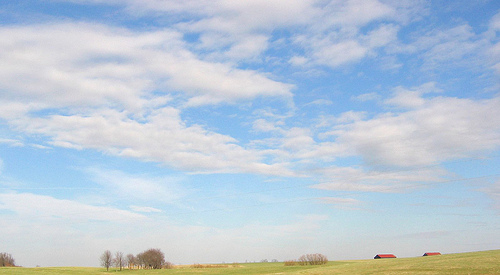
Refreshing look at at the sky in early March.
(*photo credit)
March 12, 2011 Right to
Clean Air
Is our right to fresh air
an inalienable right? Since air is needed by all breathing creatures, no
one has a right to contaminate it and endanger others. Outdoor air polluting
sources include industry, powerplants and motor vehicles. Industrial air
pollutants from particulates to nitrogen and sulfur oxides have been major air
contaminants. With the advent of coal-fueled, steam-driven pumps and engines
and metal smelters emitting sulfur oxides, modern industry has polluted the
air. Coal and oil-fueled electric-generating plants have only exacerbated the
problem. Victims of polluted air suffer with asthma, emphysema, and other
respiratory diseases and find life-demanding breathing a challenge.
Is fresh air protected
by proper fuel use? Sufficient fuel for cooking and heating is needed for
higher quality life. Although various options for fuel sources (wood, fossil
fuels, solar, etc.) exist, in given circumstances people do not have access to
some of these choices -- and must heat or cook with what is at hand. If energy
is cheap or free, users will tend to be less conscious about wood or some other
fuel use. Most people could thrive at lower winter temperatures by wearing
heavier clothing. In summer they can thrive without vast differences between
outdoor and indoor temperatures; in fact, this is also unhealthy. Tolerable
indoor summer temperatures can be provided by taking steps to cool dwelling
space through ventilation in cooler periods.
Must we change from
fossil fuels to renewable energy sources? China, India, and other nations
fuel their emerging economies by cheap coal with resulting pollution that
affects human health. Surging middle-class people clamor for petroleum-fueled
vehicles, which add ozone, carbon monoxide and other major contaminants to the
already polluted air. Emission control devices have reduced pollution
considerably, but delaying strict energy efficiency standards has exacerbated
problems by allowing emission volume to increase. Acid rain, resulting from air
laden with sulfur and nitrogen oxides, corrodes structures, contaminates rain
water, harms vegetation, and causes respiratory damage to humans and animals
alike. Excessive carbon dioxide triggers climate change.
Is domestic fuel use
resulting in indoor air pollution? The contamination of air through
domestic cooking in inefficient stoves using wood, dung, or other forms of cheap
biomass is a global problem. These devices are used by between two-and-a-half
and three million people; they generate smoke that causes respiratory and eye
problems for cooks and other residents, especially the very young and very old.
Good ventilation and exhaust systems are often lacking. The WHO reports that
1.6 million premature deaths (half of them children) occur each year due to the
use of these defective devices resulting in increased incidence of cataracts,
pneumonia and even tuberculosis. Efficient stoves and solar cookers have
promising possibilities for millions of homes needing fresh air.
Prayer: Lord, move
us to call for sufficient energy for all.
|
Special Message
March 12, 2011
Today, the
U.S. Environmental Protection Agency is being threatened with gutting of
its ability to control carbon dioxide emissions and thereby curtail
climate change. Ironically, a Congress doing this under the pretext of
fiscal responsibility has been recently termed by the Catholic News
Service as "the most pro-life Congress." However, when considering the
entire web of life, some representatives and senators deny the
human-causation of climate change emissions and are moving to become the
LEAST pro-life Congress. Deliberately, to reduce or eliminate funding
under the excuse of being fiscally responsible is disingenuous.
To escape to other issues regarded as equally pressing, when
Earth herself is under threat, is reprehensible. In face of today's
great temptations of denial, excuse, and escape, advocates who champion
the cause of the fetus, senior citizen, hospice patient, and death row
inmate cannot continue to remain silent on environmental issues.
The
failure to defend the entire web of life when our environmental agencies
are under attack will not soon be forgotten. In fact, publicity of a
"partisan approach to pro-life issues" may weaken our previously united
stand. How can neglect and silence greet the actual decline in animal
and plant populations, the rate and variety of decline not witnessed
since human life began? Human-generated gas emissions threaten to
increase overall global temperatures, acidify oceans, disrupt coral
reefs, melt glaciers and permafrost, and precipitate floods and droughts
of monumental proportions. The vast majority of the scientific
community predicts very rapid climate changes to surface and perhaps
accelerate in the next decade. We cannot afford to allow the same
propaganda mills that denied tobacco-smoking dangers for several decades
in the last century to do the same stunt on this issue -- only the
specific industries funding them are different.
A silent
pro-life community is partisan on perhaps the most decisive issue of
this century. With a united community that includes pro-life people and
the traditional environmental community this threat to our planet could
be halted by support for the USEPA and its programs. A greater reason
to give support at this time is that China and India look to American
leadership in fossil-fuel reduction programs. If our country fails to
act, forget about the predicted two-degree global temperature rise, and
expect this rise in temperature to double; the results for the world's
poor will be catastrophic.
Please
make your position known. What is happening in gutting environmental
programs is PRO-DEATH, and it should not be tolerated. We cannot afford
to remain silent. The Congress must be persuaded to defend life in all
its forms.
Al Fritsch, S.J.
|

Lady bird beetle on flowers of the spicebush, Lindera benzoin.
(*photo credit)
March 13, 2011 Facing
Current Temptations
Then the eyes of both of
them were opened, and they realized that they were naked.
(Genesis 3:6)
Along with free will comes
the temptation to do misdeeds. We have our trials in life that arise either
from within ourselves individually or collectively or from without. We are
tempted to place our security in material things such as military hardware. We
consider our country as number one and thus worthy of certain fame and
privileges; we pretend we can defer payment of what is given us here and now to
future generations and that includes our financial and social problems. Like
Adam and Eve in the Garden of Eden we are tempted to see ourselves as almighty
gods.
Can we see the start of
Lent as the favorable moment for renewal? We must confront our false
security, our sense of privilege, and our misplaced priorities. We ought to see
that we clothe ourselves in materialism and act like the emperor with no
clothes; we regard this as our outstanding claim to fame; and we believe we have
the situation under control. Jesus undergoes the test immediately after his
baptism by John the Baptist when his ministry becomes public. During this
series of tests in the desert Jesus is like us in every way but sin. While
Mark's account of the temptations is brief, both Matthew (4:1-11) and Luke
(4:1-13) speak of three incidents though in a different sequence. Unlike our
first parents, the Israelites, and each of us at different times, Jesus
resisted. These were the tests that would deal with his public ministry when he
would announce liberation of captives "with the power of the Spirit within
him."
Are we tempted like
Jesus? A major temptation is that material things and military hardware can
give us security. "Not by bread alone" is the quote from Deuteronomy
which Jesus uses in response to the test. Instead of spiritual values we
substitute the falseness of expensive military bases, tanks, drone planes, and
aircraft carriers. However, the more we seek to depend on these military means
to safeguard us, the less secure we are as a people. Worldly goods entice us to
"need" more such goods; however, spiritual security calls us to solidarity with
the world's poor.
Positioned on the pinnacle
of the temple, Jesus endures the temptation to do something dramatic, to have a
spectacular entry into public life through the flair for attention and drama,
and to be an instant hero. We dream of soaring among others like a figure
skater who floats about effortlessly, and we dream of being and remaining
privileged. We are enticed to the world of fiction and forget that obedience to
God's will is an ever-deepening mystery. On the high mountain of affluence we
fail to see that we cannot defer to a later time the growing economic
indebtedness facing America. In failing to face reality we are tempted by a
false power to do whatever we wish; and this is food for disaster.
Prayer: Lord,
deliver us from temptation and from all evil.

Overseeing the pie-making process.
(*photo credit)
March 14, 2011
Right to Work for a Livelihood
Work is our human activity
that gives us our livelihood, our expression of creativity, and our privilege to
serve others. Since the time of our mortal life is short, work is our rare
opportunity to live productively and prepare ourselves for eternal life.
Through work we unite ourselves in society with those who enter into God's
ongoing creative activity.
Does everyone have a
right to work? If work helps to make us who we are as we strive to fulfill
our mission in life, all of us deserve the opportunity to work. Our citizenship
both here on Earth and beyond involves the right to a livelihood. How does one
with the privilege of property have a right to deny another who is less
privileged the right to a livelihood? Is the lack of recompense different from
working as a slave? We know that with time in the present economy the
unemployed become the unemployable. During this cruel Great Recession those
with longer unemployment are being discriminated against in competing with more
inexperienced workers. Thus begins a spiral downward of the competing workers
who regard employers as hiring those who will work for the least while doing the
most. A taint is placed on the unemployed that challenges the right-to-work
structure.
Is the government the
employer of last resort? Unemployment is an abomination and should never be
tolerated, for it denies to another a livelihood. At least elemental fairness
means we must harken back to the Works Progress (later Projects) Administration
(WPA) during the Great Depression in which eight million got jobs to help
support them and their families. No one doubts that today such meaningful jobs
could be created in construction of our badly corroded infrastructure or the
multitude of services needed by the youth, elderly, ill, illiterate and
disabled. The work is there; the people are willing; only the actual resources
are lacking. Tax the rich and use governmental funds and create the jobs.
Does enforced work lack
an expression of free will and is it thus an inhuman condition? It took the
human race millennia to determine that slavery and forced labor conditions ought
to be banned. Unfortunately, such conditions still exists in this world.
Ought each of us to do
the type of work we like best? In a perfect world, that should be the
case. However, this is an imperfect world and sometimes we must do tasks we do
not like. Private enterprise does not deliver quality work to all, especially
since much make work of the past is now performed by mechanical means in a more
technical society. However, service work opportunities abound and eager hands
coupled with trainable minds and willing hearts could do a host of tasks for
others, e.g., care-giving, teaching, assisting those disabled, repairing the
environment, growing adequate food, and constructing proper lodging and
sanitation systems for the people.
Prayer: Lord, teach
us the dignity and privilege of working.

Hellebore, Lenten rose.
(*photo credit)
March 15, 20111
Right to Freedom of Press and Communications
The ongoing saga of
WikiLeaks, and its revelations opens a major debate in our country and in
the world as to what information is in the public interest. Certainly military
dispatches, diplomatic cables, and bank records could be private, but they could
easily be in the public interest also, especially when lives of many people
depend on the suppression or revelation of their contents. I have become
ambivalent about this form of communication and the dust of the controversy has
not settled yet. Listening to reporters for the New York Times telling
of self-censoring to omit persons who may be at risk is not satisfying.
Can we support Wikileaks
and its ilk? My own shift from being at odds with such revelations,
especially when hearing that bank records were forthcoming, yielded to more than
curiosity; some important information may be emerging worth learning about
(March 16). What is being hidden from public view when the citizen has a right
to know and prosecutors have the duty to go after wrongdoing in the greedy
financial world? This right to know by citizens is so often infringed upon by
the cloud of secrecy in the business world that a dash of light could be most
helpful.
Is it the citizen's
right to have a global free flow of information? When the Nobel Peace Prize
was awarded on December 10th to Chinese dissident Liu Xiaobo, his government
would not allow him to leave prison, nor his wife to leave the country to
collect the prize, nor his country to hear the Oslo ceremony or even news of his
award. Any key word that brought an Internet user to that event was suppressed,
showing the power of a communications network to be controlled by autocratic
authorities.
Will cyber-attacks or
simply their threats limit our freedom to communicate? A friend called me
to say that her domain server notified her that her blog was under attack due to
something political that she had posted. It may have been one of these Daily
Reflections. Is this an example of threats that we all face for declaring
ourselves for or against certain issues? Granted, the blog arena is more
susceptible than informational networks to such attacks, but why ought a hacker
be allowed to trash or disrupt an assembly with differing views from that of the
attacker?
Is control of the media
outlets by wealthy owners a restriction on freedom? One can denounce
repressive regimes and yet overlook media moguls who have the economic power to
create a subtle propaganda machine that can repress information for forming
public opinion. When major outlets are only open to specific views and people
become increasingly passive, freedom is being subtly suppressed. Today the
Internet's free access is threatened when some can be offered advantages and
privileges for money. A vigilant society must become aware of such possible
practices.
Prayer: Lord, allow
us the freedom to express ourselves and the responsibility to say what needs to
be expressed.
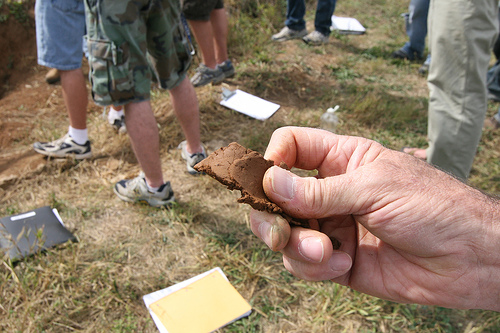
Students on field trip learn about soil classification.
(*photo credit)
March 16, 2011 Right
to Proper Education
Today, many of us suffer
from a glut of information, not a paucity of it. Others are retarded from
reading and learning through lack of proper educational opportunities (qualified
teachers, materials, facilities, transportation, etc.). Granted, some of our
current information overload is technical and is better handled by experts;
other information is true but selected and nuanced so that it gives casual
readers a false impression; and some information should remain private. Today
on Freedom of Information Day much is worth reconsidering (see March 16,
2006).
Does needed information
lead to corrective judgments about possible harm or ill effects of certain
consumer items? Consumers certainly have a right to know. The American
Freedom of Information Act opened a store of material to those qualified to
examine it and use the proper procedures to procure it. Last year Wikileaks
furnished vast stores of reports on military, diplomatic, and financial matters,
some of which are matter for experts and some of which when revealed could be
harmful to the original informants. Information in its basic form opens the
person exposed to a vulnerability to attack that makes one ask, "Should all this
be released to the general public?"
Should technical
information be restricted to those who have the expertise to make correct
judgments? Quite often technical information is subject to false
interpretation because of an inability to assess it properly. One needs climate
change information (e.g.. ice melting rates, soot deposit on glaciers, ocean
acidification rates) so that correct judgments can be made. Without knowledge
of trends in climate we cannot ascertain the impact of human causative factors.
The right people need the right data to make judgments; when these are citizens
of a democratic society they need accurate data in order to know for whom to
vote.
How can non-public
information be restricted? The imprudent give out their credit and banking
information at will along with their hidden thoughts and foibles -- all for
public records that are not erased. Not all personal information ought to be
shared -- and job seekers find this out the hard way. People tell others things
in confidence and this information ought to remain as such for various reasons.
The private records of people telling about a past that is far behind them
should not constantly surface and haunt them long after they have changed their
behavior. The Internet can be a non-forgiving source of confidential
information, and in this age in which public expression is so available, it can
easily get into the wrong hands. The right to retain certain information is as
important as the right to divulge it. Every individual has a life history that
is to be safeguarded as long as others are not hurt by its confidentiality.
Prayer: Lord help us
to sort the important information from the trivia, to obtain proper
interpretation, and to make ultimate wise decisions as to personal health,
finances, and civic matters.
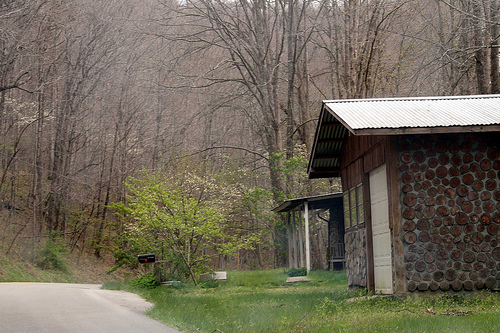
Cordwood home near ASPI. Livingston, KY.
(*photo credit)
March 17, 2011 Right
to Affordable Housing and Home Care
St. Patrick's Day is
a perfect time to consider the Irish practice of paying for home caregivers,
even if they are relatives living in the home of the elderly or ill person. This
practice allows for the person to enjoy the comfort of home and not an
institution (which would be more costly and is hardly ever as well received).
Economics dictates giving a home life to the best degree possible. When
professional nursing and physical therapy can be provided, this method can --
but not always -- surpass institutional circumstances. Much depends on the
amenities of the home dwelling (restroom, bath, and cooking facilities, etc.).
Does support for
caregivers provide a "bang for the buck?" When caregivers need help, the
caregiver's financial allotment can be subdivided for the needed assistants.
This extends economic benefits to helpful neighbors who assist with bed care,
laundry, house cleaning, obtaining supplies, maintenance, and cooking. Such
part-time jobs are of immense value in lower-wage communities and distribute
income at the very low end of the pay scale.
Are there benefits for
the ill person? Going beyond community economics we find that caring for the
sick can be done better at home under normal circumstances. Attentive care is
of a more immediate nature and less bother and, often though not always, with
greater privacy and quietness. In the case of hospice persons, the care given
in familiar surroundings generally makes the person more comfortable at this
difficult time of life. Most often, the terminally ill crave surroundings where
loved ones can cluster and support them in an atmosphere of peace.
Is denial of proper
housing a traumatic experience? People need a place to live in peace and
security. Denial of housing because of inability to afford high costs creates
an atmosphere of homelessness and all associated difficulties. The homeless,
abandoned, and those who are refugees are really no exception. The assurance of
a home adds to the quality of our living and so the state of homelessness
becomes quite traumatic for many who crave a place called "home." The fact that
many homeless people have to be institutionalized is not an argument against
focusing on homes primarily. Furthermore, some of the ill cannot be given the
total care needed, and so the second best is an adequate health care facility, a
substitute at best for individual homes.
Should governments
provide affordable housing to those in need of access, safety, and protection
from harm? Private homes may be more desirable, but the more essential
needs must be met by the government in cases of homeless people and refugees.
Where private homes are not available, public housing should exist for
independent living, and institutions for those needing total care. The
government is a means of last resort when private means fail.
Prayer: Lord, help
us to see the value of home life and to attempt to extend it to all to the best
degree possible.

Houstonia caerulea, Quaker's lady.
(*photo credit)
March 18, 2011 Right to
Access to Health Care
On Nov. 18-19, 2010, Pope
Benedict XVI spoke at the 25th International Conference on Health Care. He
stated that it is the moral responsibility of nations to guarantee access to
health care for all citizens, regardless of social or economic status or their
ability to pay. He went on to say that there are great inequalities in health
throughout the world. In developed lands and especially through medical tourism
(going outside a country for treatment and operations) one finds
pharmacological, medical, and surgical consumerism. In underdeveloped land
there is a lack of essential medications for the sick poor.
Should equal access to
health care be available to all? When one observes globally victims without
basic health protection on one extreme, and then notes those who have costly
elective surgery on the other, something seems amiss -- and it is. A
comprehensive global health care system for all could cost one trillion dollars
or more annually. However, that is far less than the cost of the global
military budget. The potential for global coverage is emerging. To say the
world's economy could not support a global health care system is hogwash. Of
course it could if the economy were changed to support the commons and not the
privileged.
Didn't the World Health
Organization (WHO) set very ambitious Millennium Development Goals in 1990?
In the first seven years progress was made in areas of AIDS, malaria, and
tuberculosis. Half the world population were at risk of malaria and
treatments have been scaled up in recent years. Tuberculosis death rates
declined from 1990 to 2006 from 28 per hundred thousand people to 25. The
serious HIV epidemic found 2.7 million new cases reported in 2007 with two
million deaths in that year plus 33 million living with HIV infection. Leprosy
saw a dramatic decline from 5.2 million cases in 1985 to 212,000 in 2008.
Is global health care
showing progress? Underweight children declined since 1990 by 27%, but
progress among nations has been uneven; there were some 112 million underweight
children in 2005. Some progress was made in the first half of the 2000 to 2015
time span. In 2007, under-five child mortality rates had declined from 12.5
million in 1990 to 9 million in 2007. Progress depends on increased
immunization coverage, use of insecticide-treated mosquito netting, use of oral
rehydration therapies during episodes of diarrhoea, and improved water and
sanitation systems. Note that the first areas are relatively low-cost with
respect to dramatic results. Access to health services has improved in the past
few decades. Births attended by skilled health personnel increased in the
years 2000 to 2008; globally, one-third of birthing mothers do not have access
to skilled personnel. Maternal death rates especially in Africa (a half million
per year) have not changed in the past fifteen years.
Prayer: Lord, make
us aware of health inequalities and start to do something about it on local,
national, and global levels.
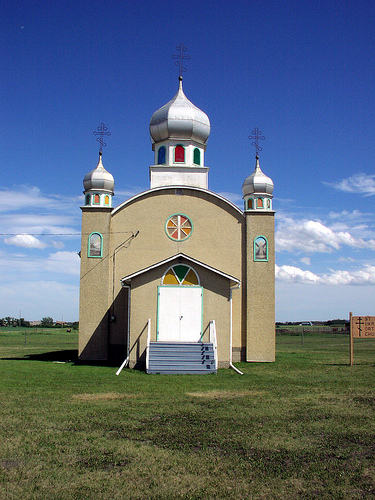
Saint Elias, Spirit River, Alberta, Canada.
(*photo credit)
March 19, 2011 Right to
Public Assembly and Worship
On the Feast of
St. Joseph, the patron of the Church, it is good to review the right of
people to assemble in public and to celebrate together by worshipping God as
they see fit.
Should we advocate for
the basic right to public assembly? Each year various rights organizations
note current restrictions on various religious groups in different countries.
Most often at the bottom of the list is North Korea. Also often on that part of
the list is Saudi Arabia, which limits public worship to Moslem practices alone,
and only permits private worship by individuals or small groups in homes. China
places limits on religious groups under its controlled conditions and restricts
the Catholics from ordaining bishops without state approval. A number of
countries, especially from behind the old Iron Curtain, have sanctions against
new religious groups having free access to the country.
Shouldn't everyone have
a right to worship as he or she feels drawn? Public worship is always an
aspect of religious practice that goes beyond the prayer life of individuals or
families within the privacy of the home. For many believers, this public
manifestation is an integral part of acknowledging a Supreme Being and the
benefits from general public celebration. A communal expression of reverence
enhances their own worship life and should not be denied individuals or groups
provided the practice does not interfere in the free exercise of another's
religion. Globally, in some cases the public practice is restricted to one
group and accusations of false acts as that of blasphemy (e.g. in Pakistan and
Iran) by the dominant religion's adherents can lead to drastic curtailment of
freedom and even a threat to life or imprisonment.
Should we champion
rights for all people? The United States was founded on a principle of the
separation of church and state. This is the foundation for a variety of
religious expressions. Even the colonies prior to the nation's full
establishment had restrictions on various religious groups and even on other
Christian groups, set by the established churches. Even the constitutional
guarantees of freedom of worship did not erase the barriers to Catholics and
Jews throughout the various states.
Do biases exist against
those considered foreign to the majority within communities? Today, with the
wars raging in Afghanistan acts of violence are shown to some Moslem communities
in America. Christians in Iraq have seen their public places of worship bombed
and people killed. Pity the poor soul who wants to become a Christian in
Afghanistan; they have to be spirited out of the country in order to escape
death. World history is replete with instances of trials for those seeking to
worship God in public. Hopefully, the day will dawn soon when religion may be
freely practiced any place on this Earth. Let's await that day.
Prayer: God, help us
to defend the right to have public assembly, and especially the right to worship
publicly.
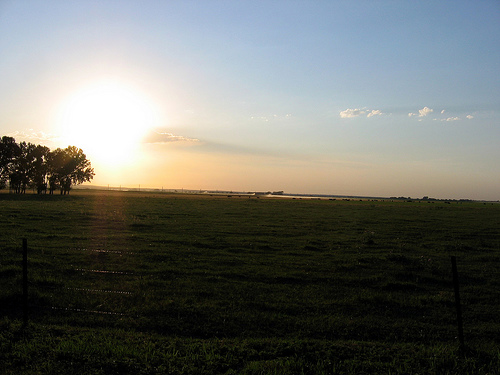
Morning.
(*photo credit)
March 20, 2011
Transfiguration as Goal, Calling, and Blessing
And he was transfigured
before them; his face shone like the sun and his clothes became white as light.
(Matthew 17:2)
The transfiguration of
Christ is a foreshadowing of our entry into the glory of the anticipated New
Heaven and New Earth. Just as addressing temptation makes us aware of current
limitations and imperfections, so the Transfiguration prepares us for great
things to come. We join in the paralysis of Peter, James, and John present at
such an event. Eternal life is at a distance and yet we await the rays to shine
through on occasion.
In this year of St. Matthew's
Gospel, we discover that the Transfiguration event is at the very heart of his
Gospel. All leads up to and all flows from this event -- for Jesus is Lord of
history and Messiah. At the Transfiguration we see in that streak of light an
eternal mystery beginning to unfold. We stand beside Peter, James, and John and
speak in "imaginative" prayer. We spend the time at prayer feeling the wind at
the mountain, sensing the physical surroundings, hearing the voices from the
cloudy mists and, along with the three apostles, seeing the brightness of the
transfigured Jesus. His eyes meet ours as we observe the scene. We hold steady
and ask what we can do at such a moment.
He saved us and called us
to a holy life, not according to our works but according to his own design.
(II Timothy 1:9). God's plan and mysterious will are what we seek. We discover
an emerging glory in an eternity into which we are called, and an ongoing
process in which we have a part to contribute. It is not that we make ourselves
better for receiving gifts, but the immense generosity of God works through us
and fills us in the midst of our unworthiness. Sincere gratitude becomes the
mainstay of our being, all the while aware that ours is a limited role in the
divine plan.
All the communities of
the Earth shall find blessing in you. (Genesis 12:3) The blessing that is
God's gift to us is to radiate out from us, transforming us into the divine
image. We are filled with gratitude and with enthusiasm -- the God within. We
are called to bless with blessings given, making what we do a double blessing.
The Transfiguration calls us to truly be and, in seeing that we are what we are,
to discover that we can do great things as directed by the Spirit. Being
Christian transforms us; we seek to risk doing public actions, not denying
problems, excusing ourselves, or seeking to escape from responsibilities. We
are a holy people. This openness to being part of the Transfiguration allows
the gift of God to work on those with whom we meet. Like Peter, we wish to make
a permanent monument to this calling, but we too discover that events ahead for
us are evolving, not static.
Prayer: Lord, send
us where you will. Help us to hear and listen to your call and to be willing to
be fit instruments in your divine plan. Allow us to enter into the
Transfiguration by becoming a transfigured Christ to others.

Rhododendron maximum. Cumberland Gap National Historical Park.
(*photo credit)
March 21, 2011 Spring Has
Sprung: Being Right with the World
SPRING
HAS SPRUNG
I heard the mockingbird
again at daybreak,
holding a varied tune
of all that brings on spring.
I suddenly realized that
time's moved on
and yet patterns
stay put as sort of "winter cling."
That season's gone and
another has slipped in unnoticed.
Dandelion carpets
are now yellow and green.
The tree buds swell and
four-legged mammals scurry about,
Nature's hesitant
resurrection all color and sheen.
While we have a mantra
about hating winter --
and those frosts and
flurries past due time
that threaten apple
blooms and early plantings
and fail to let the
mercury climb.
Nature comes again in
fits and starts
and we, too, have
seasonal changes in hymn and song,
but we become more
willing to spring than cling
to that worn
expression -- "winter's clung too long."
----------------------------
Should we couple rights
concerns and those dealing with the commons? Having surveyed our rights and
the private domain of our lives for the past two weeks, we now move to what we
hold in common -- something of equal importance to private rights. Spring is
the season to affirm that we need to get outdoors more often, and the great
outdoors is something we hold in common with others: the air we breathe; the
water we drink; the land for gardening; the freedom to move about and to trade
goods; the outer space that we do little more than observe in awe at night; the
vast oceans and marine space; the fragile parts of this planet that require
cooperative regulations; and the wildlife and trees that abound.
Are
the various commons solely individual concerns or something more? The
movement out to others means that the protection and reclaiming of our commons
is more than can be done by individual people acting alone. The commons
requires people to work together as a body; to fail to do this is to neglect our
Christian duty and the purpose in life. Those areas beyond our individual
control such as outer space and the planet's air and water require larger and
larger aggregates of concerned people. A global environmental regulatory system
is utterly necessary and must be established within the next decade in order to
keep our planet alive.
Prayer:
Lord, help us to find quiet time in our lives to be satisfied with the wonder
all around us. Yes, there is much to do but help us just to be here and be
satisfied with being present.
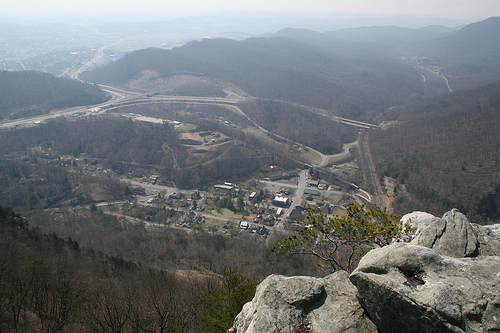
A bird's eye view of Middlesboro, KY.
(*photo credit)
March 22, 2011 Right
to Land -- Particular Land?
Reclaiming the land is one
of the most difficult of all commons issues, for land is definable and
boundaries can be easily drawn. Some nomadic tribes have held in common the
land on which they moved about; others settled on a particular tract and called
it "theirs." Unlike air and outer space, land does have definable boundaries --
and these have often been the subject of wars.
Do
inhabitants have a right to possess certain land and how is that right derived?
Perhaps people do have some right to movement from place to place thus making
ownership by those already there somewhat problematic. However, those making a
living growing their own food on particular parcels of land do seem to have a
right to continue to use this or that land for purposes of livelihood. What
about commerce with the products of a particular piece of land? Do all the half
of the world's population who are urban have a right to particular space? What
space? These general questions are hard to resolve, but we can seek to refine
questions to more and more particular land-related circumstances:
Do
small farmers have a right to grow their essentials of life without being forced
from their land? These producers are often driven from lands in various
places including America through oppressive regulations and increased property
taxes. Also in China and other rapidly emerging countries political pressure
and deception may hasten exodus from farm lands. The subsidies in richer
nations that go to large agricultural enterprises overwhelmingly compete with
small-scale farming products. These small farmers lack "fair market"
advantages, namely access to fertilizers, tools, and access roads to markets.
Ought
productive land to be controlled by local populations for the production of food
and other essentials? In many parts of the world, larger landholders use
the land for their own extravagant purposes -- lawns, hunting preserves, scenic
areas. Also agencies can squeeze local farmers to grow specialty crops for
domestic use or export, and thus turn local farming into servitude for broader
commercial interests.
Ought fragile land to be held in common so as to protect it from
exploitation? This applies to much of the mountains and deserts, to critical
watersheds for large populations, to large expanses of forestlands that are the
planet's lungs, to areas of historic or cultural significance, and to virtually
all non-agricultural and non-urban areas. In these areas national governments
or their local subsidiaries ought to be land guardians and not private holders.
International agencies ought jointly to control Antarctica and strategic
shipping routes and straits.
Prayers:
Oh Creator of all land, help us to understand what is commons, and what needs to
be privatized for better management and fairer distribution. Give us a sense of
belonging and sharing and not widespread possession and control by a privileged
few.
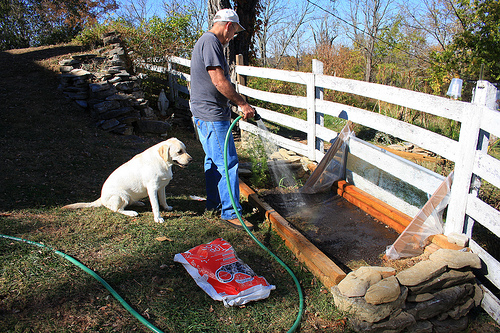
Work to nurture plants in a cold frame.
(*photo credit)
March 23, 2011 Growing
Greener: Being Right with Land
In
this month of interior ecology we need to move beyond our individual issues and
include the social aspects of conservation and reclamation. Precisely, we ought
to focus on communal action dealing with abandoned land reclamation.
Isn't
reclamation a national issue? Being right with land includes a national
component, for all suffer from abandoned land; however, this is also a state
and local concern. Focus may be given to the following: protecting land being
presently damaged by exploitative practices or wandering or overpopulated
wildlife; confronting culprits and making them accountable. This includes such
reclamation procedures as attending to abandoned land, whether by removing trash
and junk, halting erosion, initiating desalination procedures or by planting
vegetation and especially trees. Both collective and individual actions are
necessary.
What
is an example of greening our land with others? A coalition of
environmental and community groups in Pennsylvania has been addressing local
environmental, watershed planning, restoration, and protection efforts through a
multi-agency state- and partly-federally-funded program called Growing
Greener. This program has spanned the past decade and to date has expended
1.3 billion dollars on reclaiming lands, through some estimate the total costs
of attending to all abandoned state lands could exceed ten times that amount.
This highly successful program is the largest single investment of state funds
in Pennsylvania's history for tackling environmental issues ranging from greener
watershed protection and maintenance of state parks to coastal zone and
abandoned mine clean up -- and includes tree-planting programs.
How
is Growing Greener funded? The Pennsylvania program has been funded through
a $4/ton municipal waste disposal fee as well as resource extraction fees. The
federal- and state-funded flood protection portions are matched up to 35% by
local government funds. Strapped by heavier state financial commitments, this
highly successful program is due to expire next year. However, program
supporters hope that extraction fees from the expanding process of fracturing
shale formations for natural gas will prove promising as a source of revenue for
continuing Growing Greener.
Can
this be extended to every state? Taken as a nation environmental programs in
every state with similar problems could exceed $300 billion. This could be a
major national investment opportunity with true "bang for the buck." U.S.
national gas reserves are the highest in forty years, and increased by 11% in
2009 alone; these reserve additions were driven mostly by widespread shale gas
development. Placing fees on extracting this recently-developed fossil fuel
supply could be salutary, since much environmental damage has been fossil
fuel-related (coal and oil).
Prayer:
Lord teach us to seek to participate in righting the wrongs that have been done
to our precious and fragile lands.

Preparing to plant one hundred wild plum seedlings.
(*photo credit)
March 24, 2011 Planting
Trees: Being Right with Forests
Are
there forest commons? This planet's forests are the lungs of a living
organism, and require being kept healthy. The value of forests is best realized
through efforts to remedy deforestation through planting trees. Even in the
best of circumstances some regard tree planting as hackneyed or perhaps child's
play, since youth can contribute to planting projects. Yes, planting trees is a
soft approach to deforestation, but there is a profound spiritual value in
trying to do something positive in times of massive threats and destruction.
Healing our wounded Earth forces us to come together and act collectively
through a variety of hard and soft activities in order to heal our wounded
planet.
Who is in charge of tree
planting? The planting can be undertaken at various levels of participation:
family, neighborhood, parish, wider community, county, or state. The individual
involvement by average citizens generally goes down with each increased size of
the social aggregate, but organizational involvement needs to occur. However,
the individual operator has a place in a social tree-planting event through the
following actions: selecting a specific site, clearing the area, digging the
hole, planting the tree by spreading the roots and adding soil and any
amendments, watering, firming the soil in place, and staking and protecting the
sapling if necessary.
When ought we to plant, or
does timing vary with location? March is a perfect time to prepare for our
local arbor day, for inquiring as to what trees can be obtained free or at a
bargain price, for getting people to perform the tasks at hand, for securing
tools, for finding the ideal sites for the planting, and for gathering crews
that should include a mix of older and younger folks. Spade work is essential,
and knowing whether to add lime or other materials as well as watering the
planted trees are all ingredients to a successful story. In many places, deer
population control may be essential and so the selection of tree variety could
depend on the appetite of wildlife for certain types of young saplings. The
community involvement requires planning in advance.
Must planted trees be
cared for after planting? Planted trees need care lest they wither in the
hot summer when rains are not plentiful. Watering trees soon after planting,
and even later when mature is an exercise in tree care. Other such exercises
include protection in areas left after forest-harvesting operations, abandoned
farms and vacant lots, road and building construction, and resource extraction
(coal, sand, gravel and minerals). Many land areas need reclaiming through such
healing practices as tree maintenance, namely, removal of exotic species,
protection from development, thinning tree species to make room for tree growth,
and removal of diseased trees.
Prayer:
Lord, you are the tree of life. Help us to see that our living planet needs the
green healthy skin of proper tree cover, and give us the energy to help bring
this about.
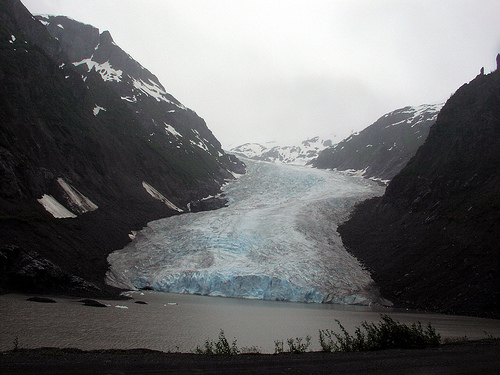
Melting glacier near Stewart, British Columbia.
(*photo credit)
March 25, 2011
Affirming Climate Change: Being Right with Earth
On
this feast of the Incarnation, we ought to realize that we have a saving
role to play. Our Earth is always changing; in some ways this planet is being
born, and we are the midwives. Ours becomes a constant concern that this birth
proceed properly. Quite often Christians and all people are asked to think
about human life that is nascent or "being born." We must protect the human
fetus in this delicate process -- AND we must also protect our nascent world
that is in "one great act of giving birth" (Rom.8:22). Without a living planet
we cannot sustain our mortal and individual human lives. Today, we are aware of
something our ancestors did not realize, namely, that through our material
extravagance we can destroy our fragile Earth.
Yes,
our ancestors knew unprotected land could erode, but what about a planet's
condition? Also today, politicizing activities can be directed to denial
of climate change through human causation. Those quick to address one political
party for failure to confront pro-life issues such as abortion must acknowledge
that negligence crosses party lines. We must communicate with our legislators
ASAP, and tell them that those of us who are pro-life demand that they give
attention to the impending disaster facing our wounded planet by the growing
disparity of wealth, by failure to promote truly fair taxes, and by a silence
over the radical change of climate caused by excessive human use of resources.
Can we citizens make a
difference? Many of the new members of the 112th American Congress have a
desire to do the right thing. Thus dozens of these new members who regard
themselves as pro-life must realize the moral connection between protecting the
fetus and protecting our fragile and easily wounded Earth. Future life on this
planet demands a halt to the recklessness of the imprudent; these want to
overlook the destructive effects of burning more -- not less -- fossil fuel with
each succeeding year. These legislators hold much of our national policy in
their hands, and they, along with those already in legislative bodies, certainly
can make a difference. Citizen pressure can make a difference in a democratic
society.
Should
we be concerned about life in all its forms including planet life? It is
precisely in the arena of environmental protection that the individual must
understand that his or her social commitment enhances the entire web of life.
To save our world requires collective action, the will of a civic community to
say "no" to dirty fossil fuels and "yes" to renewable energy sources that now
receive only a fraction of the incentives given to fossil fuels. A cleaner
world means overcoming the deliberate effort of profit-making corporations to
continue polluting. We can save our Earth if we work together -- and this is
pro-life.
Prayer: Help us Lord
to become an incarnate people, those bent on bringing about a union of spiritual
values and material demands.

Indigo bunting, Passerina cyanea, at feeder.
(*photo by Sally Ramsdell)
March 26, 2011
Being Right with Wildlife
What
ought we to do on North American Wildlife Celebration Day?
Celebrate, yes, but what more? The "rights" of animals to co-exist with us
should be regarded as something that is connected with our responsibility to
save and enhance this planet. We need not get into an involved animal rights
discussion; it is sufficient to concede that wildlife is part of our human
quality of life. Their existence enriches us and helps us know ourselves in
totality. God creates animals and all wildlife not just for us but with us and
before us. Our coexistence is our treasure.
Must
wildlife reservations be established? Wildlife exists for its own sake, and
we who have the power to do good also have the ability to threaten and destroy;
we are to discover, promote, protect, and give space for wildlife to flourish.
We may never meet a tiger in the woods and yet their presence in the woods
enriches us. Being "there" gives meaning to the "here" where we reside. In
developing nations, wildlife reservations are luxuries, for poor inhabitants
need protein. They obtain some of their essential food needs by harvesting
wildlife, whether flora or fauna, that when immoderately pursued can result in
endangered or extinguished wildlife. Wildlife is a commons demanding global
support by supporting policed reservations.
Are
wildlife forays outdated? To go and infringe on wildlife territory for our
sporting gratification is a form of selfishness. On the other hand, to allow
wildlife to thrive in their natural setting is a godly blessing. We need to
protect wildlife habitats for their own sake. Let's challenge both deliberate
hunting for sport's sake and an invasive eco-tourism that infringes on wildlife
habitats. A good alternative is to sponsor careful camera crews to picture
wildlife in the least disturbing manner, and then promote records that allow
virtual visits through movie, TV and Internet -- not by individual physical
wildlife forays.
Should
wildlife hunting as sport be banned? Let's go a step farther and talk about
hunting; let's be particularly interested in early "conservationists," wealthy
enough to travel distances to hunt game for sport. The perception that the
affluent enhance tourism through trips, lodging, and food is overblown.
Certainly some contact with wildlife is needed for protective measures, for
areas of research, and for obtaining materials for virtual tourism projects,
provided special care is taken not to disturb the fragile habitats. Such
permitted activities can assist in hiring local people for associated matters
such as policing.
Are
international wildlife conservation programs necessary? If wildlife is a
global commons and of value to all people, wildlife protection becomes a
worldwide issue, and research by wealthier nations is needed. Funding
priorities need to be made.
Prayer:
Lord, allow us to see wildlife as a precious part of our creation and worthy of
protection and enhancement.
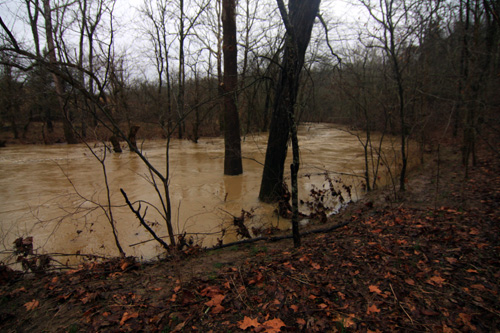
Thompson Creek after heavy rains. Mercer Co., KY.
(*photo credit)
March 27, 2011 Samaritan
Woman at the Well: Gentle Confrontation
Give me some of that
water so that I will never get thirsty. (John 4:15).
Christ,
as living water, enlivens others at an individual, group, or larger community
level. From the story in John's Gospel today we learn how Jesus confronts
others in a merciful manner.
Confronting
the individual. American secular culture dictates that all do their own
"thing" without being challenged by others, for these are private matters.
Jesus gives us a lead on what can be done even in such delicate circumstances as
dealing with a person of a different culture in these realms of privacy. He
does not avoid the road detour so often taken by Galileans to skirt the hostile
Samaritan territory; he takes his disciples straight through Samaria; he stops
at the well and speaks to a resident and a woman at that. But that is just the
beginning. He tells her all about herself by a direct provocation, "Go and call
your husband." Many Americans would like to soften the story, for that
Scriptural interchange is not according to our cultural way of acting; it delves
in off-limited private matters. Listen carefully. Jesus is gentle, earnest,
and loving; he says she is right that she has no husband, for she has had five
but the one she is with is not her husband. The woman's acknowledgment and
receptivity is astounding.
Confronting
the disciples. The continuation of the story within a story involves other
confrontations as well. The disciples return and are speechless that Jesus
would be conversing with a Samaritan woman, and they express this at least
facially. They urge Jesus to eat, but he confronts them because the work of
spreading the word is before him. Jesus is so consumed by the desire to go out
to others that this involves confronting the disciples, as hungry as they are
with a field ripe with the harvest.
Confronting the broader
community. All the while the Samaritan woman, as first Christian
missionary, hastens back to spread Good News to her community. The woman's
community hears from her with her new-found enthusiasm that she has been
confronted by the long-awaited Messiah. The Good News is spoken, heard, and
repeated by taking the word to others. She may have felt her unworthiness but
all of us are imperfect for the noble tasks at hand. Spreading Good News is
evangelistic when it includes a sense of our unworthiness and yet is spoken in
the most honest manner possible given our own limitations. The Spirit speaks
through us as sowers, and others hear and may even regard their own efforts as
greater than that of the sower. One sows and another reaps. I sent you to
reap what you have not worked for; others have done the work, and you are
sharing the fruits of their work. The Lord confronts the villagers as a
body, and they hear with their own ears. Jesus goes to them and stays with them
two days. Thus all, individuals, disciples, and the community are confronted by
Jesus.
Prayer:
Lord, teach us to be willing to meet others and to confront them with Good News
in the gentle manner of Jesus.
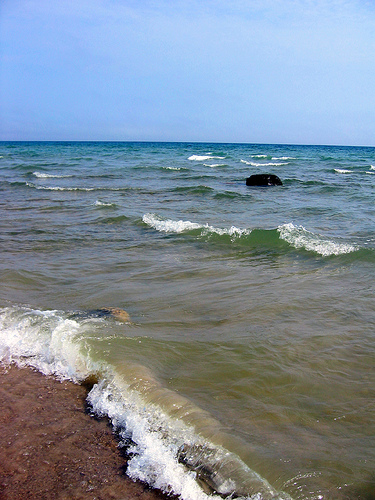
A stroll along the beach in mid-March.
(*photo credit)
March 28, 2011 Being
Right with the Seas
Are
vast oceans susceptible to pollution? Oceans can be damaged. For almost
five centuries mercury used in placer mining ended up in our oceans; recent
observations involve large masses of floating plastic bags and junk on the
surfaces of the seas. In the August 11, 2010, daily reflections we mentioned
the maritime commons and how the BP oil spill was so damaging to the Gulf of
Mexico. Oceans are affected by human action; climate change is causing the
oceans to rise; fisheries are being depleted through exploitation; increased
carbon dioxide is acidifying these oceans; colorful corals lose their luster and
tourist potential.
Ought there be effective
policing of the oceans? The maritime commons has a rich store of natural
treasures as, for instance, many colorful but quite fragile coral reefs. These
reefs are often tourist destinations, but their vast expanse makes them nearly
impossible to police. Furthermore, rising ocean temperatures, acidity, and
general water pollution are causing the coral to fade and coral formations to
erode. Some coral is stolen or damaged by human misdeeds, but that amount is
quite insignificant when compared to damages from global climate change.
Who
owns the resources of the Oceans? Exploitation of ocean mineral and
petroleum resources will most likely continue to occur. In part this is due to
poor regulations by nations with shorelines and the lack of jurisdiction by UN
agencies. Over-whaling occurs and is a challenge to control, especially since
some is done under the aegis of scientific research. Currently overfishing,
especially by the use of corporate factory ships with immense draglines, takes
in many marine species indiscriminately, and injures or kills many others in the
process. Corporate mineral and resource extractors are poised to start massive
extraction processes when the technologies are fine-tuned. Corporate interests
influenced the United States' refusal to sign the "Law of the Seas" in the early
1980s, and thus were able to keep UN-sponsored international rules from being
effective.
Oil spills in coastal areas such as the March 24, 1989, Exxon Valdez
disaster can be controlled by national naval units. Is oil drilling in
international waters a global concern and does it require international
regulations? Ocean fishers know that fish stocks are finite and that harvest
can be controlled.
Can
piracy be halted without international cooperative efforts? Piracy is an
ancient and yet also a modern problem, for it entices the utterly destitute
(e.g., Somali people) to seek instant riches by holding up trading ships on the
high seas. If piracy cannot be handled by individual navies, then global
cooperative efforts are utterly necessary. Individual random naval vessels, no
matter how well armed, can not cover a vast ocean.
Prayer:
Lord, incite us to act to save our seas, a part of your creation's treasure that
is entrusted to us.
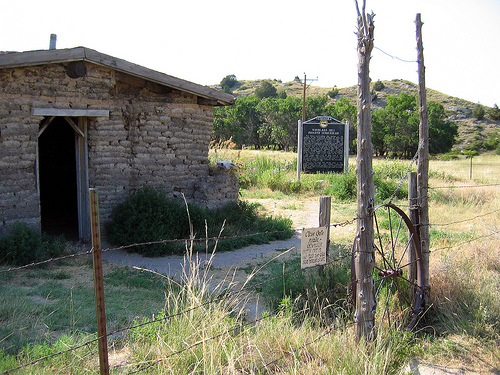
Windlas Hill sod home, near Lewellen, Nebraska.
(*photo credit)
March 29, 2011 Being
Right with Cultural and Historic Sites
We
seek to be right with others who hold dear cultural differences -- and
the treasures of what they hold of special value are part of the ongoing commons
of human history. Our collective responsibility is to help others preserve
these treasures for future generations. Thus we must broaden our perspective
and knowledge of what other peoples consider as their cultural heritage. We
must learn about them, listen, discuss, and defend their cultural expressions --
the celebrations, foods, and practices of these our close and more distant
neighbors.
Should
our respect for religious shrines be limited to our own specific religious
beliefs? This raises a question of access and protection of these religious
sites that act as magnets that draw large numbers of pilgrims to specific
locations and events. Often these sites and events involve beautiful settings
and unfamiliar ceremonies that attract crowds. We need not necessarily
participate or even visit the site itself, but we still are concerned about the
safety and protection of religious participants. Many popular sites ought to be
declared global heritage areas with protection for safe travel and
accommodations.
Are
historic sites of local or greater concern? Historic sites are worth
preserving when considered of great significance by certain cultural, national
or regional groups. When our respect extends to these, economic development
pressures that infringe on battlefield areas, historic buildings or cultural
grounds can be more easily challenged by the public. Commercial interests often
play down historic significance to birthplaces or residences of recognized
personages (e.g., civic leaders, reformers, artists, or inventors).
Highlighting local historic places enhances the tourist value and pride of
communities. Such sites include places of early settlements that were
undertaken at great sacrifice on the part of colonists -- and these are worth
recognition.
Should cultivating culture
be a global concern? The quality of our lives is enhanced by flourishing,
diverse cultures -- for in diversity comes richness of human expression. The
basic mission of UNESCO is to contribute to sustainable human development in
a culture of peace underpinned by tolerance, democracy and human rights, through
programmes and projects in UNESCO's fields of competence: education, the natural
and social sciences, culture and communication and information.
Should
we support retaining threatened languages? An added concern is that of
minority languages that are threatened by native abandonment for a more
predominant commercial tongue. Our cultural respect ought to extend to keeping
languages flourishing (see "Language Revitalization and the Commons" on January
27, 2011).
Prayer:
Lord help us to extend respect for the values that others find in their
communities, and help us treasure our own and those cultures with which we are
only partly familiar.
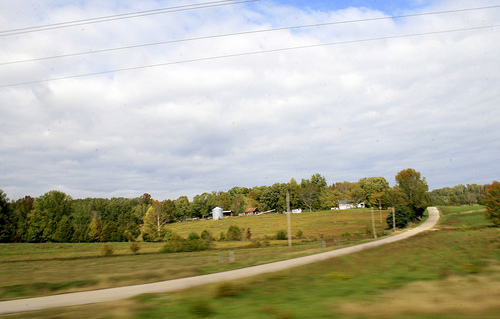
Along the road to a small Kentucky farm.
(*photo credit)
March 30, 2011 Human
Mobility: Being Right with Migrants
You
must not molest or oppress the stranger, for you were once foreigners yourselves
in the land of Egypt. (Exodus 22:20)
Are
we free to move about? Isn't part of being human to learn to crawl, walk,
run, visit, migrate? Mobility is part of our restless nature -- fleeing from
dangers, learning about our cultural roots, searching for work opportunities,
and enhancing our quality of life through movement. Much affects those who move
and those who are the hosts of the immigrant, tourist, pilgrim, refugee. Travel
means, destinations, and basics of those moving all add up to challenging
circumstances. Yes, we're free but --
Is flight by a refugee
from danger a valid reason for moving? The obvious "yes" may beg the
deeper question, namely, how can conditions in the place of origin be changed so
that the refugee can return after a temporary stay abroad. Those who suffer
within their own lands may have valid reasons to flee, and since we are all
strangers and guests, we have a duty to be hospitable.
Are
learning and cultural fulfillment a valid reason for human movement? Few
question when someone with money comes to tour a place and to spend money here
in order to get away and enjoy a new culture. This movement as temporary
tourist or as pilgrim calls for hospitality -- and all benefit by the moving
experiences.
Are
work opportunities valid reasons for migration? This is a more difficult
issue than tourism. All things considered, it seems far better that work
opportunities be met at the land of origin; thus less disruption to families
and community are involved and all can enjoy being together. Work opportunities
could be brought to workers rather than workers move elsewhere, but history goes
on. Barbarians crossed the Rhine into the Roman Empire; eager Mexicans cross
the Rio Grande; Chinese farmers migrate to eastern industrial cities -- all part
of a grand movement of people to something more promising. A host of challenges
includes decent lodging, work permits, fair pay, and health benefits to
newcomers. Some welcome migrants because they are willing to work; others build
barriers to stop their movement.
Is
a better quality of life a valid reason for movement? Many of our ancestors
came to America even with existing work opportunities; they were looking for
something better and so felt justified in coming and settling in our fair land.
Being right goes beyond our personal invitation or reception of these people in
our communities. Immigrants have willing hands and open hearts; so ought
residents to have hospitable faces and open hearts. Our immigrating ancestors
expected as much. The struggle to get the DREAM (Development, Relief, and
Education for Alien Minors Act of 2009) legislation approved is part of this
ongoing concern.
Prayer:
Lord, help us who were and are strangers and guests to welcome others in the
same condition.
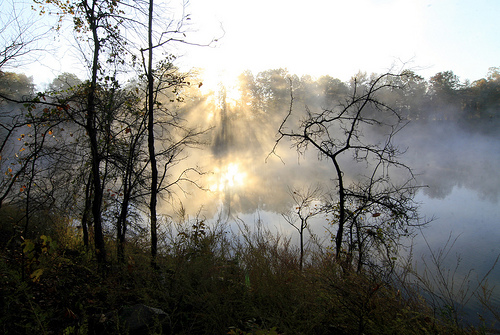
Misty morning sunrise, Pulaski Co., KY.
(*photo credit)
March 31, 2011 Being
Right with Material Goods
We know that our efforts at
establishing justice extend to material goods that one wants to trade or buy or
sell. The founding of our country included a number of provisions that allowed
the free flow of goods to take place across state boundaries. Commerce down the
Mississippi River was a major concern in the early days of the Republic, and the
federal government stepped in to secure that and other commercial routes and
bases of trade quite early in the national history.
Is
business ethics a component? Movement of goods is a part of a complex
business picture that includes personal ethical issues such as quality of
materials and specific quantity of items exchanged or bought or sold. Countless
regulations dealing with units of measure, instruments and their calibration,
and price levels and advertising for products exist. Goods move, but only in a
protected business atmosphere, and so the personal practices are important along
with governmental regulation of commerce.
Are
free trade agreements lofty goals or are there drawbacks? The prior question
may be, "Is any trade free?" If the two parties are unequal and one has a great
advantage over another, then that freedom could be compromised. Commercial
concerns extend beyond individual persons and includes the interests of nations
and larger corporations. The phenomenon of globalization is associated with
pipelines and container ships and trade; and trade for freedom to move goods
from one place to another is a key ingredient. The "free trade" emphasis from
NAFTA to that with South Korea has become a national policy goal. Each deserves
careful scrutiny.
Can small farmers be
assured of markets for their products? This is a major problem partly
because of uncertain prices and the high up-front costs of investing in
fertilizers, pest control agents, as well as the barriers to taking products to
distant market centers. The United Nations International Fund for Agricultural
Development says that rising food prices should give small farmers a boost and
should enable them to invest some money in irrigation and other farm
improvements. However, farmers in less-developed lands have only increased
cereal production by 1% in the recent decade, whereas those in rich countries by
12%. Support for small farmers in developing lands is of utmost importance as
the world population moves on to nine billion by 2050. Movement of goods is a
key and transportation facilities (seaports, airports, railways, and highways)
deserve attention and improvement.
Are
financial resources to be shared in common? Commerce includes monetary
funds and material goods, and this involves a complex commons component. This
is a grave issue especially when our nation and world discover the power of
concentrated wealth, namely 90% of possessions controlled by 1% of the
population.
Prayer: Lord, give
us the courage to initiate a process for redistributing funds and material goods
to those in need.
|